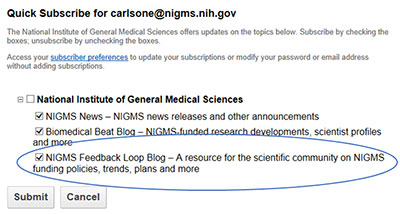We’re recruiting for a program director (also known as a health scientist administrator or program officer) to manage research grant, fellowship, training and other types of awards focused on the cellular and molecular mechanisms underlying inheritance, gene expression and development. The position is in our Division of Genetics and Developmental Biology, and it involves working collaboratively with other program directors in the division to support outstanding science in these fields.
Candidates should have expertise in the use of state-of-the-art molecular genetics and/or genomics-based approaches to gain a mechanistic understanding of one or more of these, or related, areas: cell growth and differentiation, signaling pathway dynamics, DNA and RNA replication, DNA recombination and repair, transcription, the function of coding and noncoding RNA, RNA processing and protein synthesis. Familiarity with NIH extramural funding as an applicant, reviewer or NIH scientific administrator is a plus, and outstanding written and oral communication skills are essential.
There are two vacancy announcements: one for candidates with current or former federal employment status and one for candidates without such status. Both announcements close on May 5, 2016. Please see the NIH HSA website for position requirements and application procedures. The Applying for Scientific Administration Jobs at NIGMS blog post offers additional background and tips. For more information about the position, contact David Wittenberg at 301-451-1828.
Not looking for a position right now? Please help us out by forwarding this information to others who might be interested in this opportunity.


 Ever since the NIGMS Feedback Loop launched in 2005, we’ve sent periodic digests of its content to our grantees, applicants and others. To help our readers receive time-sensitive information sooner, we’re now offering a way to get individual posts as they’re published on the blog.
Ever since the NIGMS Feedback Loop launched in 2005, we’ve sent periodic digests of its content to our grantees, applicants and others. To help our readers receive time-sensitive information sooner, we’re now offering a way to get individual posts as they’re published on the blog.